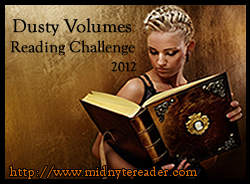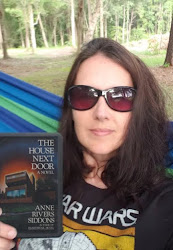First published in 1892, "The Yellow Wallpaper" is written as the secret journal of a woman who, failing to relish the joys of marriage and motherhood, is sentenced to a country rest cure. Though she longs to write, her husband and doctor forbid it, prescribing instead complete passivity. In the involuntary confinement of her bedroom, the hero creates a reality of her own beyond the hypnotic pattern of the faded yellow wallpaper--a pattern that has come to symbolize her own imprisonment. Narrated with superb psychological and dramatic precision, "The Yellow Wallpaper" stands out not only for the imaginative authenticity with which it depicts one woman’s descent into insanity, but also for the power of its testimony to the importance of freedom and self-empowerment for women.
I was completely unaware of this little gem until last week. Now that I've read it and perused my Goodreads, I see that several of my friends have read and loved it, and it's one of the "1001 Books to Read Before You Die" selections.
So how did I stumble upon this story? I was looking to see if I could get my hands on a cheap copy of House of Leaves. House of Leaves completely defeated me earlier this year. I had to return the copy I was reading back to the library, but it's one that I don't want to give up on. As I was searching Amazon, I noticed that the results list for House of Leaves reads like a giant list of horror recommendations. All of the books listed were the ones you always see on the "best of" lists. Listed amongst these horror staples was "The Yellow Wallpaper".
Ooh, what's this?
The Yellow Wallpaper was written in 1892 and has since entered the public domain. You can get the Kindle version free on Amazon or download a free ebook off of Project Gutenberg. What also caught my eye was the audible version for $.97 (after my membership discount). How's that for cheap entertainment?
So I gave the audiobook a listen. My initial reaction was not good toward the narration. The narrator was actually a really great narrator, but this story is a feminist story. It's a first person narrative of a woman told through her diary.
A male narrator was the wrong way to go here. Correction: It seems the narrator may in fact be a woman. (I'm so sorry!)
But the story! The story is about one woman's descent into madness. After being diagnosed with nervous depression, she's locked away to "rest" in this bedroom with yellow wallpaper. We've all been around a pattern in cabinets, flooring, wallpaper, what have you, that starts to look like a face. (Right?) This woman is kept from her work which makes her feel useless, she's anxious and depressed, and she's stuck looking at this yellow wallpaper all day.
I can imagine my sanity would dwindle, too.
The Yellow Wallpaper turned out to be an awesome story to stumble upon, and I highly recommend it. It's a short story so if you're interested, you hardly even need to set aside time for it.
Just go read it.
9/10: Highly Recommended


























